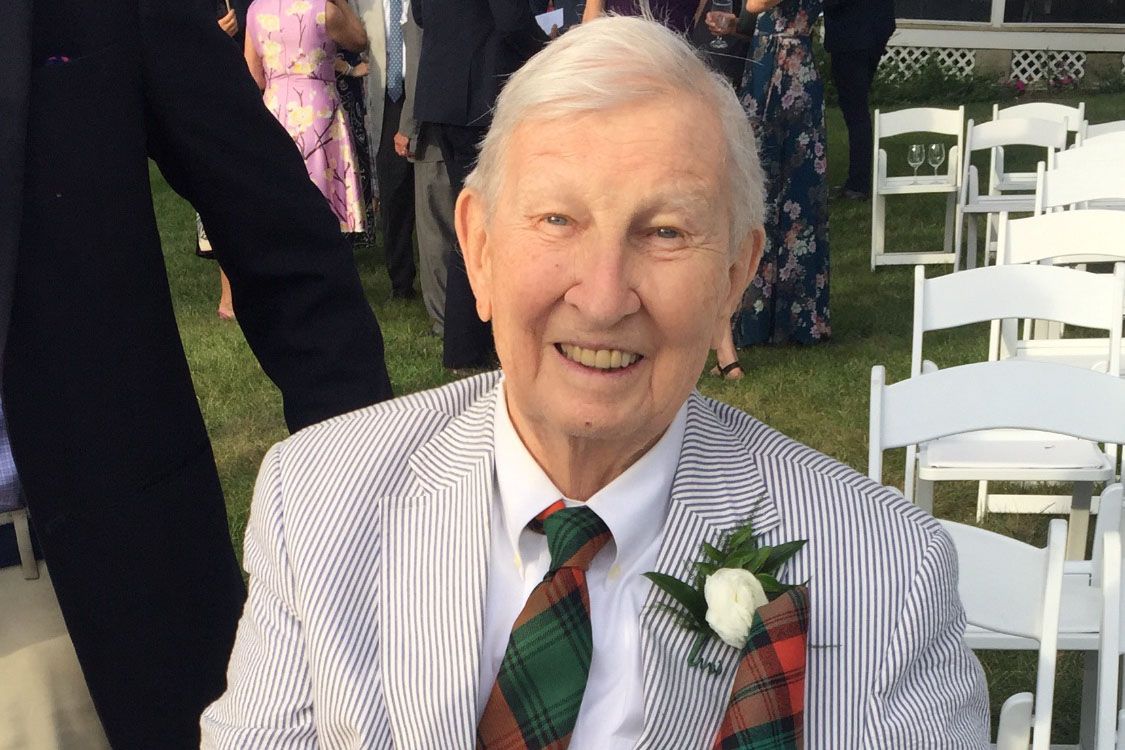Sen. Joseph Tydings had a few requests for his memorial service. One of the most important of them was that it not be held during a University of Maryland home football game.
Tydings, an alumnus of this university, a former Maryland senator and former Board of Regents chair, died of cancer Oct. 8, draped under a quilt patched with university t-shirts. He was 90.
“Next to his kids and grandkids, it was the University of Maryland,” said Mary Tydings Smith, his oldest daughter.
Tydings enrolled at this university, where he played football and lacrosse, after serving in the army. He graduated in 1950 and went on to attend the University of Maryland Law School in Baltimore.
Tydings was on this university’s Board of Regents for 10 years and the University System of Maryland’s for five, serving three terms under three governors in three decades.
Smith described her father as a principled leader.
“He was authentic, unique. He charted a political course that was all his own,” she said. “He took on unpopular positions against entrenched interests — and frankly, gained and suffered the consequences of that.”
Tydings was the son of Eleanor Davies and adopted son of Davies’ second husband, former Sen. Millard Tydings, for whom this university’s Tydings Hall is named.
Millard, also a university alumnus, was a U.S. senator and served on the university’s Board of Regents from 1946 to 1951. Joseph followed much of the same path as his father, but paved his own way with progressive ideas that his family and friends said changed Maryland politics.
His government career began in 1954 when he was elected to the Maryland House of Delegates as a representative from Harford County.
In 1961, President John F. Kennedy appointed Tydings to serve as U.S Attorney for Maryland, after Tydings directed Kennedy’s Maryland campaign and helped manage the Delaware and Florida primaries in 1960.
Hardin Marion worked with Tydings during this time and served as an assistant U.S. attorney for about two and a half years. He would later be Tydings’ campaign manager during the 1964 senate race.
“One of the remarkable things about Joe Tydings is how close his staff, both in the campaign and Washington, stayed to him throughout the rest of his life,” Marion said.
Sometimes, Tydings’ staffers were a bit of a moderating influence.
Some time after his father’s death in 1961, Tydings started wearing his overcoat. But some of Tydings’ staffers for the 1964 campaign weren’t big fans of the look.
“It didn’t look like Joe to those of us who were younger and working in the campaign,” Marion said.
The staff told Tydings’ wife to get rid of it somehow, Marion said.
“I’m not sure Joe knew for the longest time where he lost that coat,” he said with a chuckle.
Marion credits Tydings with changing politics in Maryland from “an organization-machine-run type of politics to one where anybody with good qualities could hold himself or herself out for political office and have a fair chance of attracting voters.”
Tydings became a one-term member of the U.S Senate in 1964. He won with a reform movement that had not previously existed, said John Frece, co-author of Tydings’ autobiography My Life in Progressive Politics: Against the Grain, said.
“Joe Tydings appealed to people within the Democratic party who were tired of having the bosses of the party tell them who the candidates are and what their positions would be,” Frece said.
One of Frece’s most fond memories of Tydings took place at Frece’s house when they were working on the autobiography.
Frece had found a picture from, he believes, the 1964 campaign, depicting Tydings and some of the then-Baltimore Colts doing push-ups.
“And so Joe looks at me and says, ‘I’ll show you!’” Frece said.
Tydings was about 88 at this time, but he “jump[ed] down on the floor and starts doing push-ups,” Frece recalled.
Tydings was an early voice for gun control, environmental protections and family planning. He supported the Voting Rights Act of 1965 and the Fair Housing Act of 1968, and introduced a bill that would require gun registration and licensing.
The National Rifle Association worked against Tydings’ re-election in 1970 using the slogan, “If Tydings Wins, You Lose,” according to The Washington Post.
He was also a mentor to many young people in his 90 years — many of them student government leaders from this university, Smith said. She recently found a large box filled with “dozens and dozens” of files on his mentees.
“It meant a lot to him,” she said. “He cared so much about the university.”
A service to honor Tydings’ life will be held on Nov. 10 at 10:30 a.m. in the Memorial Chapel.



